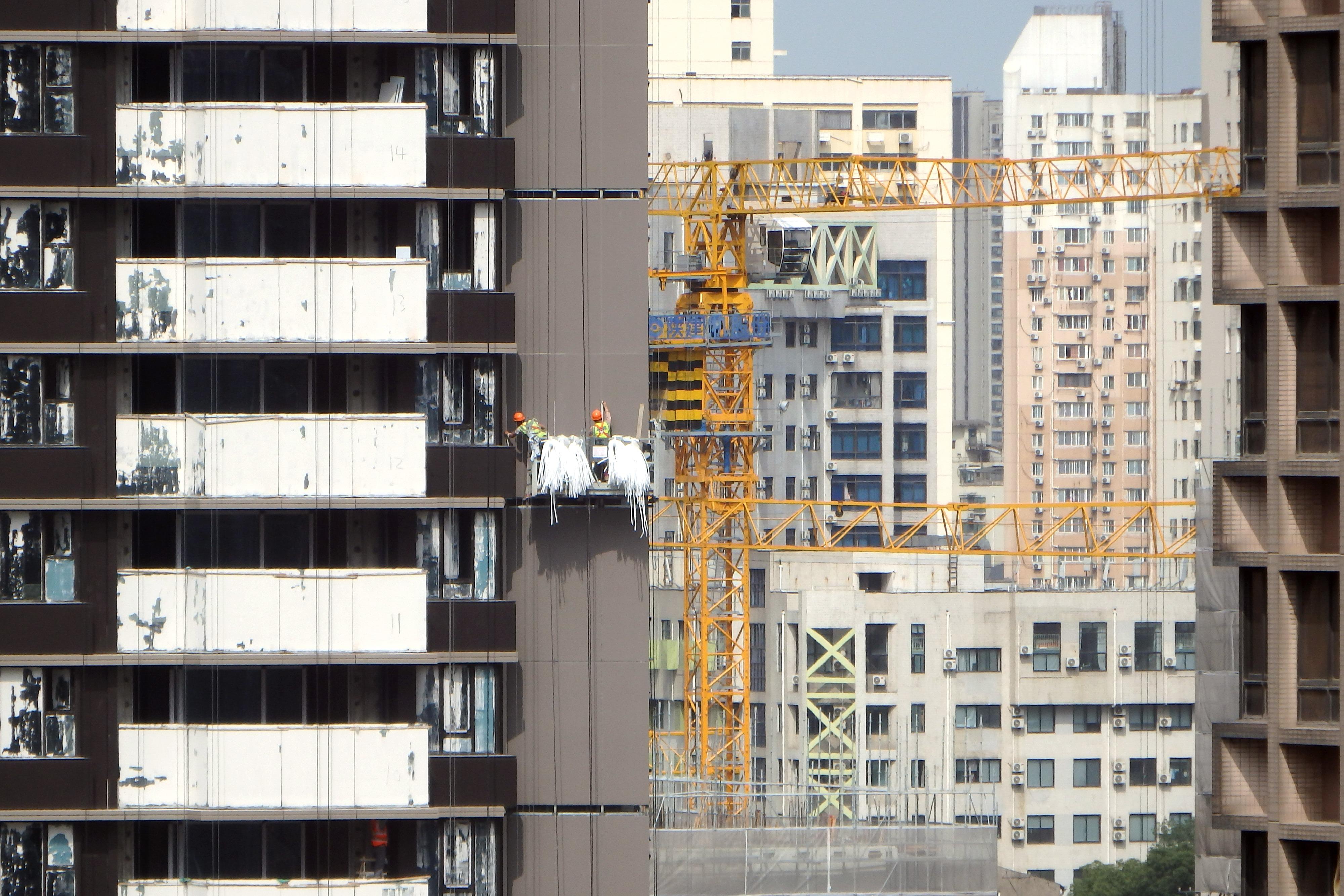Experts urge cautious approach to avoid sudden overheating, abrupt downturn
 An employee (left) from a real estate sales department introduces a residential project to a potential homebuyer in Taiyuan, Shanxi province, on May 12. (PHOTO / CHINA NEWS SERVICE)
An employee (left) from a real estate sales department introduces a residential project to a potential homebuyer in Taiyuan, Shanxi province, on May 12. (PHOTO / CHINA NEWS SERVICE)
With the rise in China's new home prices slowing and investment in property contracting, industry experts have issued calls for stronger supportive measures to restore real estate to healthy development.
As one of the nation's pillar industries, real estate accounts for about 7 percent of the nation's GDP and about 60 percent of urban households' assets, according to the Office of Central Committee for Financial and Economic Affairs.
The industry's performance is closely associated with the nation's overall economic recovery. With that as the backdrop, two views have formed of late. Some people have underlined immediate bailout measures; while others worry that extravagant policies might cause the housing market to overheat in some cities.
Lou Jiwei, former finance minister, said he believes supportive measures are urgently needed. He suggested restrictions on home purchases and home loans should be scrapped, and caps on housing prices lifted, ensuring a soft landing for the country's property market.
Lou also called for plans to levy property tax in due course, with a clear threshold of tax exemption based on the property area owned by a household.
China's property market saw new home prices in major Chinese cities either stay flat or decline in June, while pre-owned home prices fell month-on-month, according to the latest data from the National Bureau of Statistics.
NBS data also showed China's investment in property development fell nearly 8 percent year-on-year to 5.86 trillion yuan ($816.5 billion) in the first half of this year. The residential segment accounted for 4.44 trillion yuan of it, down more than 7 percent year-on-year.
"As various measures took effect, nationwide home transaction volume started to stabilize with firstand second-tier cities taking the lead in recovery," said Sheng Xiuxiu, research director for the residential sector at JLL China, a real estate consultancy.
However, with major indicators of the housing market, including residential investment and new construction, still in a downtrend, property developers should be wary of revitalizing stock assets and cautious about opening new projects, Sheng said.
A slew of measures were launched in the first half. In early January, the People's Bank of China, the country's central bank, and the former China Banking and Insurance Regulatory Commission, then the industry regulator, jointly announced that cities where new home prices dropped both month-on-month and year-on-year for three months, can decide if they would like to retain, reduce or remove lower limits for interest rates on first-home loans in phases.
In June, the PBOC made the first adjustment in 10 months to loan prime rates by cutting the over-five-year loan prime rate, on which many lenders base their mortgage rates.
"These measures mainly focus on lowering the cost of buying homes as well as improving the balance sheet of quality property developers, as part of efforts to defuse financial risks of the real estate sector and assist the property market to form a virtuous cycle," said Chen Wenjing, director of research with the China Index Academy.
"At the local government level, policies related to property had been adjusted in over 130 Chinese cities as of June 25. These policies included easing home mortgage measures, lowering down payment, and reducing home purchase restrictions. The policy adjustments are playing a bigger role in supporting the home market," said Chen Xiao, senior analyst with the Zhuge Real Estate Data Research Center.
 Visitors gather information on pre-owned homes during the 2023 Fuzhou Spring Housing Fair in Fuzhou, Fujian province, on April 2. (PHOTO / CHINA NEWS SERVICE)
Visitors gather information on pre-owned homes during the 2023 Fuzhou Spring Housing Fair in Fuzhou, Fujian province, on April 2. (PHOTO / CHINA NEWS SERVICE)
Although industry experts agree that policies need more fine-tuning to back the property market recovery, many of them urge striking a fine balance to stop the sector from either getting overheated or taking a drastic downturn.
"Any policy related to the regulation of real estate needs to be implemented under the premise' housing is for living in, not for speculation'," said Shaun Brodie, head of research content for China with Cushman & Wakefield, an industry consultancy.
"Additionally, it is necessary to take into account the specific situation of each city and then carefully make customized policy tweaks to ensure sustainable growth within the housing market of a particular city in question," Brodie said.
Earlier this year, with the full relaxation of the COVID-19 pandemic control policies, and given the long-standing backlog of demand for housing, the new homes market recovered, especially in cities that have long been hot spots for homebuyers. However, after the sales boost, demand gradually cooled, Brodie said.
Chen Sheng, president of the China Real Estate Data Academy, said the lifting of home purchase and mortgage restrictions in firsttier cities will likely pull buyers away from neighboring areas, affecting the housing market in smaller places.
Market insiders said the new homes market in China's first-tier cities — Beijing, Shanghai, and Shenzhen and Guangzhou in Guangdong province — showed strong resilience in the first half.
Brodie said China Real Estate Index System data showed the four first-tier cities recorded sales of 1.55 million new homes in the first half, up nearly 22 percent year-on-year.
Meanwhile, key second- and third-tier cities, with the exception of a few hot spot cities, witnessed a relatively sluggish new homes market, with transactions in the second quarter showing a mild downtrend compared to the first quarter.
With calls for eliminating home-buying restrictions growing nationwide, the market should be wary of certain risks, said Chen Xiao from the Zhuge Real Estate Data Research Center.
"On the one hand, lifting of restrictions may attract speculators back to the housing market, and drive up home prices. On the other hand, any changes without more scientific and reasonable policies related to home purchases or mortgage requirements, may disturb the current market order," Chen said.
But Chen also noted that considering the recent market performance, more effective policies are expected to boost market confidence.
Li Yujia, chief researcher at the residential policy research center of the Guangdong Planning Institute, said the suggestion to scrap home purchase restrictions may unleash a certain amount of demand, but the effect of any such decision on demand recovery will not be long-lasting.
"The home purchase restrictions were originally introduced to prevent speculative investment. So, lifting of such restrictions might merely allow high-net-worth individuals to buy more apartments, without really creating a positive impact on underlying inelastic demand and the demand for better homes from existing homeowners," Li said.
 A real estate project is under construction near the Bund area in Shanghai on June 4. (WANG GANG / FOR CHINA DAILY)
A real estate project is under construction near the Bund area in Shanghai on June 4. (WANG GANG / FOR CHINA DAILY)
Considering that transactions for new homes have improved over last year, and with the country's leadership keen that the real estate market should neither rebound too swiftly nor cool down too much, policy adjustments should not be too drastic, Li said.
China, he said, is implementing a new development pattern for the industry, under which priority should be placed on restoring rational demand for homes for living in (rather than speculative investment).
Yu Yifan, 31, a white-collar worker at a startup in Shanghai's Lingang Special Area, recently bought a 120-square-meter apartment in the area, after a house hunt that stretched for more than six months. "I have been working at Lingang for about eight years and always wanted to own a home here."
Yu typifies China's urban homebuyers, a group that accounts for inelastic demand. "Many people said Lingang is too far away from the city center of Shanghai, but I think differently. Over the past few years, I have seen the area's infrastructure improve rapidly, and both business and living environments are becoming better and better. I see Lingang as a place with great potential and bright future."
Brodie said so far this year, hundreds of policies have been introduced in the residential market. Many of these policies are city-specific, but the common goal is to stabilize the overall market.
"Any future policies should be a combination of consistent short-term and long-term policies that are city-specific, in order to avoid overheating or its opposite, but at the same time guide the market toward high-quality and healthy development coupled with sustainable market growth," said Brodie.
What is needed for the healthy development of the real estate market is neither overheating nor an abrupt downturn, industry experts agreed. Excessive relaxation of restrictions, they said, will lead to disorderly inflows of capital, while excessive tightening will cause a sudden downturn. What is needed is consistency in policies to promote sustainable market growth, they said.
During a news conference of the State Council Information Office on July 14, Zou Lan, head of the monetary policy department at the PBOC, made it clear that there is still room for optimizing the existing local property policies that vary from city to city.
Zou's remarks sent a positive signal that more policy adjustments that are more accurate and precise than those of the past may be expected, said Chen with the China Index Academy.
However, Zou's remarks also suggested that the policy alterations will be based on existing measures; therefore, all the parties concerned in the real estate industry should keep their expectations reasonable, Chen said.
Sheng at JLL China emphasized prevention of financial risks, including improvement to the balance sheets of good-quality property developers, thus guiding the sector's capital flows, investment, mergers and acquisitions back on to the right track.
"Improvement of property developers' financing and investment conditions will depend on the consistent and accelerated recovery of property sales, so as to bring about a virtuous cycle in the sector's development," said Sheng.
Brodie with Cushman & Wakefield said the recovery in the residential market will depend highly on government policies and the continued recovery of the overall economy in the second half. If policies are executed well and economic growth remains steady, then steady property demand would deliver sustainable growth of the residential market.


